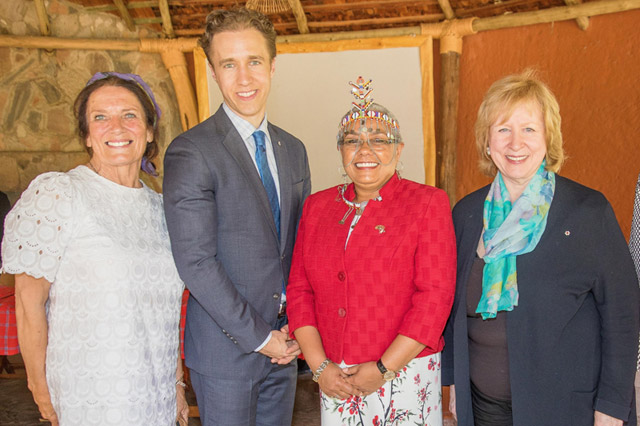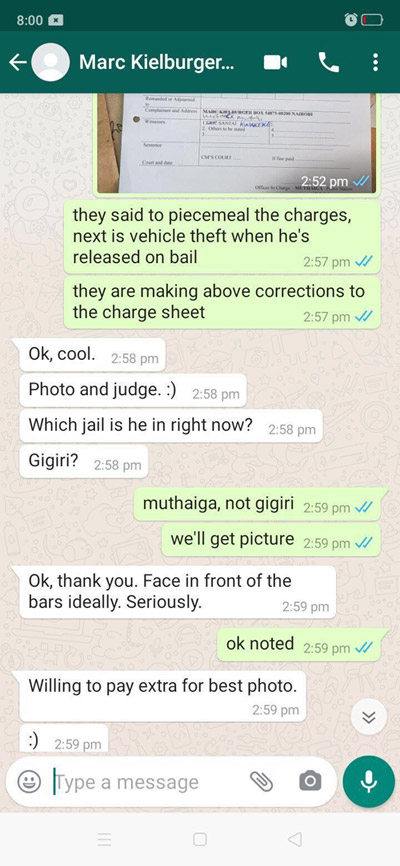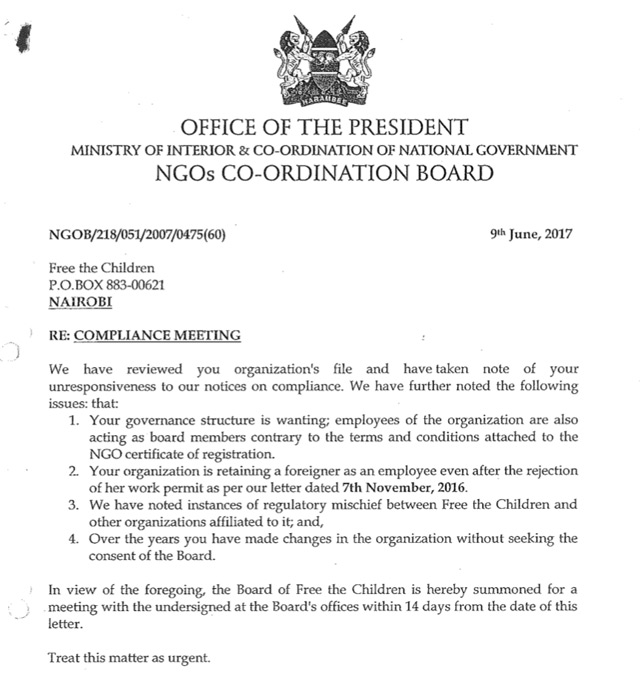
With additional reporting by John-Allan Namu of Africa Uncensored. Ilustration by Andrew Barr.
When Marc and Craig Kielburger announced that WE Charity would close operations in Canada, they explained that they had to do so to protect African children.
“Putting children first means prioritizing them above the charity,” read a statement the co-founders released in September.
In an emotional interview the brothers gave to CTV News, the Kielburgers explained that they would sacrifice their dream of building a Social Entrepreneurship Centre in downtown Toronto and sell WE Charity’s Canadian real estate, valued at $50 million, to create a permanent endowment to sustain projects such as a hospital in Kenya, a boarding school where women can escape early marriage, and a college “for all young women in East Africa.”
“Literally, they save lives,” Craig said of their projects abroad. “They have to continue.”
What the brothers did not mention was that they already transferred ownership of these projects out of Kenya and into the hands of their Canadian charity, through a private company — in order to protect those charity assets, they claim, from the alleged fraud of one of their own employees. The transfers also came after a government regulator accused their Kenyan charity, Free The Children (FTC), of “regulatory mischief” and a series of legal violations.

The transferred assets included WE College, which opened in 2019 with a celebratory press event attended by Margaret Trudeau, former prime minister Kim Campbell, and the First Lady of Kenya, Margaret Kenyatta. They also included the Baraka Level 4 hospital, the Kisaruni Girls High School, the Ngulot Boys High School, the Women’s Empowerment Centre, a fleet of vehicles, and several more plots of land — all of which were transferred by FTC to a brand new Kenyan company whose sole director and shareholder was a tour-boat skipper named Jonathan “Joff” Eden Minns. The address given on that company’s registration was a post-office box in the coastal town of Kilifi, where, according to a source familiar with WE, Minns worked at the Kielburgers’ privately owned resort.
In March 2018, Minns signed a trust agreement to hand control of that company, WE Education for Children Ltd. (WEC), to WE Charity in Toronto.

An investigation by Canadaland, in collaboration with the independent Kenyan news organization Africa Uncensored, reveals a sprawling tale of money, alleged crime, espionage, and betrayal, played out across a network of entities that mirrors the WE organization’s corporate structure in Canada, which Craig Kielburger himself has described as a “labyrinth.”
WE says the reasons for the transfers were twofold: to comply with a Kenyan law that would prohibit FTC from owning agricultural land, and to protect charitable assets following an investigation into a rogue employee who had allegedly stolen from them.
But an extensive file on Free The Children maintained by Kenya’s Non-Governmental Organizations (NGO) Co-ordination Board, shows that over the same period, the charity was also facing another kind of pressure.
The NGO Board is a government body that oversees Kenya’s charitable sector, ensuring legal compliance. In 2017, it warned the charity about what it termed “regulatory mischief,” and threatened it with deregistration.
Canadaland has obtained years of Kenyan bank records, tax filings, business registrations, regulatory files, and court documents, as well as private communications from Marc Kielburger, which together provide an unprecedented look inside the WE organization in Kenya during a period of chaos and betrayal.
Our investigation can reveal:
• A government authority accused the Kielburgers’ charity of violating Kenyan law.
• A former employee accused of stealing charity funds returned the money — not to the charity, but to a private company registered to Marc Kielburger that WE describes as part of its “social enterprise network.”
• One of WE’s companies funded efforts to have that former employee arrested, and Marc Kielburger then appeared to offer money for photos of that employee behind bars.
• The Kielburgers personally own luxury real estate in Kenya valued at approximately $4 million USD, greater than the total assets that their charity Free The Children reported owning in its most recent annual filing.

Canadaland shared its investigation with Nicolas Moyer, president and CEO of Cooperation Canada (until recently known as the Canadian Council for International Co-operation), a national association representing over 90 international development and humanitarian organizations, including the Canadian branches of Oxfam, Amnesty International, Plan International, and the Red Cross.
“If proven true,” he says, “some of the allegations made in this investigation suggest the real potential for the misuse of charitable funds and the potential for the violation of either or both Canadian and Kenyan laws.”
WE Charity and Marc Kielburger have denied any misconduct or personal gain, sent extensive responses to Canadaland’s questions, and provided reports and testimonials from employees and third-party experts they hired in support of their responses, and from others.
WE Charity’s lawyer sent Canadaland a “caution” to not make negative claims based on NGO Board records, land registry records, and business registry documents, saying these sources paint an incomplete picture. On several occasions, WE Charity has threatened to sue Canadaland for its prior reporting, and in 2018 served Canadaland with two notices of libel (but has not, as of this time, initiated any suit).
“In my experience, Moyer says, “respectable charitable organizations operate very differently from the findings that you shared about the WE organization in Kenya.”
The problems at Free The Children may have started in June 2016, when Fazul Mohamed, then the CEO of the NGO Board, announced that he’d be getting tough on foreign charities operating in Kenya that employed expats instead of Kenyans. These Western employees, he said, often lacked appropriate work permits but got paid four to five times more than Kenyan employees. He criticized such foreign workers for “getting rich from the charity sector” and warned that any NGO that failed to comply with the rules could lose its license.
Five months later, Mohamed sent a letter to Free The Children to say the board was rejecting a work-permit application for a Canadian employee.
“KINDLY NOTE,” he wrote in capital letters, “that it’s a criminal offence…to engage in employment without a valid work permit/special pass. You are further advised to explore the Kenyan market for such skills and expertise.”
The following spring, on June 9, 2017, another letter was sent.
Stephen Monyoncho, a compliance officer, wrote to FTC listing further ways the Board believed the charity had failed to adhere to Kenyan law.
“Your governance structure is wanting,” he wrote, flagging the fact that FTC filled its board of directors with its own employees, in violation of its NGO registration.
“Your organization is retaining a foreigner as an employee even after the rejection of her work permit,” he continued.
“We have noted instances of regulatory mischief between Free The Children and other organizations affiliated to it.”
Monyoncho summoned FTC’s board of directors to an emergency compliance meeting, which he said would have to take place within the next 14 days.

“Treat this matter as urgent,” he advised.
Eighteen days later, the matter remained unsettled. Another letter was sent to Free The Children by the NGO board, this time from lawyer Lindon Nicolas.
“It has come to the attention of the Board that despite our refusal to issue a work permit recommendation…you have gone ahead to apply for a special pass through your social enterprise affiliate company, Me to We Ltd,” Nicolas wrote.
“[The Board] notifies you of its intention to take legal action against you,” he warned, making it clear that WE Charity co-founder Marc Kielburger himself faced consequences. “Legal action includes but is not limited to prosecution of the directors of Free The Children, deregistration of FTC, and deportation” of the employee whose permit was rejected.
The Kenyan government’s charity regulator could not have been clearer: FTC was in trouble.
In a media statement on Friday, the NGO Board’s current executive director, Mutuma Nkanata, said that at the time, “regulatory issues touching on compliance and governance” had been raised and the board “took various actions, including providing guidance on how the situations could be rectified.”
Over the summer of 2017, FTC made changes to its board structure, constitution, and bank accounts to bring them into compliance. By the end of August, board lawyer Nicolas sent FTC a letter confirming they were in the clear.
On that same day, August 30, WE established the new company WE Education for Children Limited, to begin the process of transferring assets out of FTC.
Having described WEC as “a likeminded entity,” WE tells Canadaland that it was established to “hold the shares of the property in trust, with WE Charity Canada as the beneficial owner of the humanitarian projects.” They provided a copy of the trust agreement, signed by Minns in March 2018.
In August 2018, Marc Kielburger wrote to the NGO Board to ask what regulations and guidelines an NGO has to follow if it wants to sell or transfer its assets. A board lawyer wrote back to explain that under Kenyan law, any disposal of charity assets “must be approved and monitored by the Board to safeguard the interest of the Organizations and by extension the beneficiaries.”
By then, FTC had already been disposing of its assets without NGO Board approval or oversight for months, and its 2018 annual report to the Board gave no indication that any land assets had been transferred — stating that the estimated value of its land was 28,671,781.00 Kenyan shillings, exactly the same as in the prior year’s report.
“This is what I have been pushing for since July 5th. We need him arrested.”
MARC KIELBURGER
In a statement to Canadaland, WE acknowledges that FTC’s 2018 financial filings to the NGO Board were “not fully up to date.” But they maintain that they had no legal obligation to seek the NGO board’s permission prior to transferring any assets out of their Kenyan charity. WE Charity said the transfers were made on the recommendation of third-party experts and with approval from WE Charity’s Canadian board of directors. WE sent Canadaland statements supporting this from the governor of Narok County, where the majority of the properties are located, who said the asset transfer “was overseen by Government agencies and it complied with all legal requirements,” and from Nkanata, who said FTC “sought the permission of the Board to dispose and transfer assets which was approved.”
There is no record of FTC seeking permission for the transfer in the NGO Board file obtained by Canadaland, and neither WE Charity nor the NGO Board provided these documents when requested.
“The Board lacks robust capacity,” Willy Mutunga, a former chief justice of Kenya’s Supreme Court, tells Canadaland in an email. “It lacks independence. I would say NGOs, particularly international ones, can get away with anything.”
Asked about the fact that the transfer of assets occurred in the wake of the stern letters from the NGO Board, Cooperation Canada’s Moyer says that while he “can’t draw a direct line” between them, he believes “the timing is certainly challenging and raises a lot of questions.”
WE strongly rejects any suggestion that asset transfers away from the charity — which were ultimately valued at just over $2 million USD — were prompted by the board’s increased scrutiny of the organization, stating that this is “clearly contradicted by the multiple statements by third-party legal experts, a former Board member who oversaw the transfer, current North American and Kenyan staff, and substantial, clear documentation.”
Rather, they say, the transfers were in fact an effort to protect the assets following “a case of malfeasance by a Kenyan employee.”
According to WE, a 2017 “spot check” of FTC’s accounting turned up “financial irregularities.” Upon looking into it, they determined that the organization’s country director, Peter Ruhiu, had been misappropriating funds.
Afterward, WE writes, “experts involved in the investigation recommended that it may be prudent to transfer the control of several key local humanitarian programs from Free The Children Kenya to the global organization, WE Charity Canada.”
On July 23, 2017, Marc Kielburger recorded a phone call with Ruhiu, who at the time was also the chair of FTC’s board of directors. Kielburger, according to WE, was working with Kenyan police to gather evidence.
On that call, as previously reported by Canadaland, Ruhiu appeared to openly discuss his troubled but successful efforts to bribe an NGO Board officer named “Steve,” as well as unnamed others.
“It took us eight hours to give him the first load of cash,” Ruhiu told Kielburger on the recording, darkly warning that “a bureaucrat has our lives in his hands.” He went on to lay out a plan to mend the relationship with the NGO Board.
“This is obviously mission-critical, so I get it,” said Kielburger.
WE Charity denies that Kielburger had any involvement with bribing Kenyan officials. They assert that the call was initiated at the suggestion of police, with whom Marc had acted “collaboratively” throughout the investigation. Canadaland requested documentation showing that police were involved at this time; WE Charity did not provide any.
The NGO Board “has been accused of corruption over years,” says Mutunga, the former chief justice.
In his statement Friday, the NGO Board’s Nkanata said, “The Board has not received any specific information on allegations of bribery involving its officials with respect to the matter of Free the Children. We encourage anyone with information on the bribery claims to contact us, and we shall not hesitate to take decisive action on those found culpable.
“The Board implements Zero Tolerance to Corruption policy, and we DO NOT condone graft of any form.”
The call ended with Ruhiu setting out a plan to regain Steve’s trust by arranging a quick meeting that Kielburger himself would attend to re-establish the charity’s “deal” with the regulator.
“We all will come out of this clean,” promised Ruhiu.
“Mm-hm. Yep,” replied Kielburger.
Following the call, in which Ruhiu also repeatedly threatened to kill a colleague, Ruhiu remained in his job as country director for more than seven months.
Asked why Ruhiu stayed in place for so long after they learned of his alleged crimes, WE Charity explained that they became aware of “threats to the domestic safety of Mr. Ruhiu’s wife (now ex-wife) and children,” and that the timeline of their investigation “was driven by the need to prioritize the family’s safety” and secure their transport to Canada. Ruhiu’s ex-wife remains a WE Charity employee, and WE sent Canadaland a signed statement from her supporting their responses.
Canadaland reached Ruhiu in Nairobi by phone. He declined to comment.
In a statement to police, included as an exhibit in a separate legal matter, Ruhiu provided an account of his final day on the job.
He alleged that on the morning of March 19, 2018, Marc Kielburger asked him to attend a meeting at the Tribe hotel in Nairobi. Ruhiu claimed that upon arriving, he was “ushered to a small windowless room,” where he was accosted by a group of six to seven armed men, including an Israeli security agent who was the operations director of a Kenya-based security firm that had provided services to WE as part of its investigation into the alleged theft.
Ruhiu claimed he was held against his will, given a bucket to use as a toilet, and made to sign papers at gunpoint. He said in his statement that he was handed a photo of his children and told that if he did not sign, Kielburger “would make them disappear.” He described being driven to his home by the armed men to fetch his chequebook, and then taken to a branch of I&M bank in the Nairobi neighbourhood of Gigiri, where he said he was forced to make two transfers from his personal accounts, one for $45,000 USD and another for 9 million Kenyan shillings (roughly $89,000 USD).
WE says in a statement that, “in order to distract attention from his actions, Mr. Ruhiu filed a police report with the false claim that he had been kidnapped.” WE further describes Ruhiu’s account as a “false and a baseless allegation that has been renounced by Mr. Ruhiu, contradicted by multiple statements from credible sources,” and emphasizes that he was later charged with filing a false report.
“The fact is,” WE says, “that Mr. Ruhiu met a lawyer in the hotel lobby and signed the Deed of Settlement to return the misappropriated funds.” WE provided statements from several individuals, including Ruhiu’s ex-wife, stating that they were present and that Ruhiu’s claims were untrue.
Ruhiu’s police statement offered an alternative explanation for his problems with Marc Kielburger: that he had acted as a whistleblower, tipping off the NGO Board to misconduct, and that Kielburger had vowed revenge.
In essence, both men have claimed that they were secretly working with Kenyan authorities to expose the misdeeds of the other. Neither set of claims could be independently verified by Canadaland, and neither has been proven in court — although Ruhiu is currently awaiting trial on the charge of filing a false report.
Asked how they were able to get Ruhiu to simply hand back money that he’d allegedly stolen, WE Charity says that “when presented with the irrefutable evidence, [Ruhiu] made a full confession and returned all misappropriated funds.” They note he “has a history of making false statements” and has been “thoroughly discredited.”
Canadaland asked WE Charity to share Ruhiu’s confession. They declined, saying they could not do so because it concerned an ongoing court matter. They did provide a sworn statement, dated October 4, 2018, that they described as an “Apology letter from Peter Ruhiu.” In the declaration, Ruhiu did not apologize or confess but did state that Marc Kielburger and other WE leaders “acted with the fullest integrity, transparency, and respect in their actions with myself, Free the Children Kenya, and ME to WE Kenya, in all aspects including operations, human resources, financial activities, and otherwise. Any indication to the contrary would be incorrect.”
Bank records independently obtained by Canadaland show that Ruhiu did transfer sums of money on the dates he claimed, in the amounts he claimed, and to the specific bank accounts he claimed, and made a further payment nearly three weeks later of $360,000 USD.
Canadaland also confirmed his contention that the money he transferred did not go to Free The Children’s bank account, but to a company called Araveli for Mamas Limited, which is registered to a single director and shareholder: Marc Kielburger. WE Charity says that Kielburger holds the shares in Araveli on behalf of ME to WE Social Enterprises, WE’s principal commercial entity in Canada, which turns over at least half its profits to WE Charity and reinvests the rest in its “social mission.”
When asked why money allegedly stolen from a charity was returned to Kielburger’s company, WE Charity said this was done to reimburse the costs of the investigation, which had been paid by ME to WE via Araveli.
“WE Charity decided that [recovered] funds would pay for the investigation, including the third-party costs paid by Araveli for Mamas Ltd., and all remaining funds would be used for charitable purposes,” WE Charity states.
Canadaland has only been able to find any record of police involvement in the Ruhiu case after these bank transfers occurred. A July 12, 2018, police document confirms an investigation into an alleged robbery at FTC.
WhatsApp messages sent that summer by Marc Kielburger to his employee Santai Kimakeke show Kielburger instructing Kimakeke to “spend what u need to, in order to get this done. Once arrested on this charge we are good. This is what I have been pushing for since July 5th. We need him arrested.”
When Canadaland asked Marc Kielburger about this, WE Charity said that the messages were incomplete and taken out of context. Canadaland asked for the complete correspondence, and WE said the rest of it had been deleted but that the incomplete nature of the messages meant they should be considered “doctored.”
Nevertheless, WE provided an explanation for Kielburger’s instructions to Kimakeke, saying that “spend what u need to” was in reference to the private investigators and other experts hired to investigate Ruhiu.
On September 6, 2018, Ruhiu was arrested and charged with giving a false statement to police. On the charge sheet for the offence, Kielburger was listed as a witness.
Another WhatsApp exchange found Kielburger strategizing with Kimakeke about a different charge against Ruhiu. Kimakeke told Kielburger that police were removing Kielburger’s name as a complainant and inserting someone else.
“They are making the above corrections to the charge sheet,” reported Kimakeke.
“Ok, cool,” replied Kielburger.
Canadaland asked Kielburger why he acted to have his name removed from the charge sheet, and WE Charity replied that he did so “for logistical reasons,” as he might not be able to attend Kenyan court proceedings in person.
Kielburger also asked Santai Kimakeke to take photos of Ruhiu in jail.
“Face in front of the bars ideally. Seriously,” he wrote. Kielburger added that he was “willing to pay extra for [the] best photo.”
“The real foundation of anything that charities do is trust.”
NICOLAS MOYER, COOPERATION CANADA
Canadaland asked Kielburger why he wanted this photo, and WE Charity answered that “no such photo was taken,” but that Kielburger wanted the photo for the benefit of Ruhiu’s then-wife, who “sought clear confirmation that Mr. Ruhiu was still in prison and unable to harm her or her children.”
In further messages, Kielburger sent records of Ruhiu’s phone calls to Kimakeke. “Can u go through this carefully?” Kielburger asked.
“He has a court order not to call current employees/witnesses. Otherwise he goes back to jail.”
Kimakeke identified some past employees Ruhiu had apparently called but was unable to find any then-current ones.
When asked how Kielburger came to possess the phone records of a former employee, WE Charity says, “We are unable to comment on the source of the call logs as they were provided to us by the security experts and/or coordinating with police.”
The criminal charge against Ruhiu remains before the Kiambu court.
Bank records obtained by Canadaland also reveal information about the financial activities of WE Education for Children, in the period after it received millions of dollars of FTC’s assets.
Among these are a series of significant transfers to Araveli for Mamas. Between August 1 and November 8, 2018, WEC moved the equivalent of approximately $129,000 USD to Araveli.
WE Charity tells Canadaland that Araveli for Mamas should not be considered a private company under Marc Kielburger’s name, but instead a social enterprise “assisting in women’s empowerment programs.”
[sp_wpcarousel id=”16552″]
In an earlier internal FTC document obtained by Canadaland, the charity responded to NGO Board concerns about Kielburger’s association with multiple companies operating in Kenya.
“In addition to his charitable work with Free The Children,” they wrote, “Marc leads a number of other companies that support the people and economy of Kenya,” including a tourism company and a “cottage industry” company that empowers women who produce handicrafts.
“It is important and relevant to note that Marc Kielburger and his family are the single larger [sic] DONORS to Free the Children’s international projects through donations made in Canada and then distributed overseas.” The emphasis appears in the original.
Canadaland also learned of three property-holding companies in Kenya associated with WE and the Kielburgers: Linganya Limited, Kidimu Limited, and Kujitolea Limited.
WE Charity says that Linganya and Kidimu hold their assets in trust for WE’s social enterprise entities. They acknowledge that Kujitolea is privately owned by the Kielburgers.
Kujitolea Limited lists Craig Kielburger as a shareholder and owns 5.1 acres of land in Rosslyn Estate, one of the most expensive and exclusive neighbourhoods in Nairobi.

WE Charity says the Kielburgers purchased it in 2006 for $400,000 USD.
As recently as June, it was listed for sale for the equivalent of approximately $4 million USD. It was described as “an exceptional redevelopment property in a cul-de-sac with a stunning site presently developed with 3 traditional-style houses, a cottage, and 7 staff quarters in a well-landscaped mature environment.” The listing also noted that “the entire property is secured by a boundary wall.”
WE Charity says the Kielburger family “has never benefited in any way from activities in Kenya” and that in the 14 years they’ve owned the Rosslyn property, the family generously provided rent-free space to WE Charity and ME to WE with an estimated in-kind value of $2,293,736 USD.
Kidimu Limited, which is held in trust for ME to WE Trips, owns the Toriana Beach House, a luxury resort in the coastal town of Kilifi.
A structure adjacent to the beach house was described to Canadaland by a WE organization source as a vacation home built for Marc Kielburger and his wife, Roxanne Joyal, the CEO of ME to WE. WE Charity says the structure is a “cottage” that, like the rest of the property, provides accomodation for ME to WE guests.

In a brochure whose first page depicts Joyal doing a yoga pose on a beach [pdf], she described the Toriana resort as a place “where we honour family and friends, leaving all our worries and stresses behind, and truly sink into the beauty of barefoot coastal life.”
In their exit interview with CTV, Marc and Craig Kielburger were asked what would happen to ME to WE, the for-profit side of their organization. The brothers said ME to WE had halted operations, but offered no details about what would happen to the company’s assets.
Similarly, no information has been provided about the plans for the assets of the Kielburgers’ Kenyan companies. By legal definition, they are privately held property.
As for the humanitarian projects formerly owned by Free The Children in Kenya, their current beneficial owner is WE Charity Canada — an entity that is set to cease existing in the year ahead.
Asked what the plan is for these holdings, WE Charity says, “The wind-down process is a work in process given it was announced only last month; however, the most likely outcome is that these assets will be transferred to whatever entity managers [sic] the endowment achieved through the sale of WE Charity Canada’s real estate.”
Canadian charity lawyer Mark Blumberg, in an article on his firm’s site, noted that WE Charity’s announcement that it would be “winding down” in Canada to provide an endowment for international development projects appeared to be little more than a “public relations exercise to reduce negative coverage.” He remarked on the scant details provided as to how this complicated plan would actually work.
“With respect to the endowment,” Blumberg wrote, “there is almost no information on who will actually own and control it, how much it will disburse each year, etc.”
“The announcement of the endowment raises more questions than it answers.”
Nicolas Moyer, of Cooperation Canada, worries about the effect on public perception of the whole sector.
“The real foundation of anything that charities do is trust,” he says. “We have nothing else that is more valuable. When the donors that support an organization lose that trust, or when collectively our society loses trust in charitable endeavours, we lose an ability to act in support of communities that are vulnerable and need that assistance.”
On Friday, the NGO Board announced that they are once again looking into Free The Children, “in view of new information and happenings.”